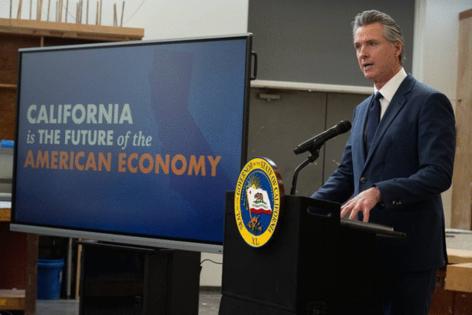Calif. Gov. Gavin Newsom faces tidal wave of tech money opposing AI regulation
Published in News & Features
SACRAMENTO, Calif. — California’s tech industry has come out in force to try to shut down efforts to regulate artificial intelligence in the state.
On Tuesday, Facebook parent Meta launched a super PAC to spend millions opposing what it considers AI regulation overreach in state government.
The announcement follows news of two other super PACs launched by tech companies, including one by Meta specifically to elect AI-friendly lawmakers in California, last month. The groups have a combined $200 million behind them to help influence elections.
“Meta is launching an effort to support the election of state candidates across the country who embrace AI development, champion the U.S. technology industry, and defend American tech leadership at home and abroad,” said Brian Rice, Meta’s vice president of public policy, about Tuesday’s launch of the political action committee, the American Technology Excellence Project.
The formation of the groups comes as Gov. Gavin Newsom considers the fate of several consumer technology bills that lawmakers approved this session, including ones that would require warning labels on social media, forbid companion chatbot features that could harm children, and require large AI companies to increase transparency and have whistleblower protections.
Meta spokesperson Rachel Holland didn’t comment on whether the company was opposing any of the specific legislation currently in front of the governor, but did say that states have proposed many bills that are poorly crafted and would stifle innovation.
The company spent $219,800 on lobbying activity during the first six months of 2025, the most recently reported figure.
Safety advocates weigh in
Online safety advocates are continuing to urge the governor to sign the bills, despite the organized opposition to regulation.
“How many Super PACs does one industry need?” asked Tech Oversight Project Executive Director Sacha Haworth during a news conference Tuesday.
“It’s clear that they have bottomless resources, but what we have is our voices, which are much, much louder and much, much stronger than they think.”
The organization receives funding from “like-minded philanthropic organizations” like Omidyar Network, founded by Pierre Omidyar, the founder of Ebay.
Tech Oversight and a coalition of other groups have been supporting Assembly Bill 1064, otherwise known as the Leading Ethical AI Development for Kids Act, which would prohibit making available to kids companion chatbots that are “foreseeably capable of specified harmful behaviors, including encouraging the child to engage in self harm, suicidal ideation, or violence, or engaging in sexually explicit interactions with the child.”
Attorney General Rob Bonta put his support behind the legislation earlier this month.
During the news conference urging the governor to sign the bill, several young women from a Sacramento suburb spoke about the effects of AI on their lives.
Soraya Johnson, a current Stanford University sophomore, said that years ago, boys on her debate team at Granite Bay High School created inappropriate videos of her using widely-available “deepfake” technology. She said she was “fundamentally violated” and felt like her privacy and body weren’t her own.
“It demonstrates how easily technological innovations, almost completely unregulated, can lead to the abuse and harm of minors like myself,” she said.
A bill signed by the governor last year, Assembly Bill 1831, made it illegal to produce and distribute child pornography developed using AI.
Current Granite Bay student Aleeza Siddique said she’s seen firsthand how AI can impact her peers’ mental health.
“I’ve seen friends get addicted to chatbots like Character AI. I’ve seen them talk about chatbots like they’re people,” she said, referencing the chatbot website that has been the target of several lawsuits after it’s been linked to children’s suicides.
“Chatbots don’t provide the connection that humans desperately need.”
Tech Oversight, Common Sense media and other groups revoked their support for another companion chatbot bill in front of the governor, Senate Bill 243, after “it was clear that a number of industry-led changes were made” at the end of the session, Haworth said Tuesday.
The governor’s attitude is unknown
The governor has not signaled how he is likely to vote on the legislation before him. But his wife, Jennifer Siebel Newsom, has in recent months been outspoken about putting stricter limits on AI, calling regulation “essential” during an August panel in Sacramento.
Last year, the governor signed 16 AI-related bills, according to his office, but vetoed a closely watched bill from State Sen. Scott Wiener, D-San Francisco, that would have imposed strict guardrails on the technology and created a state board to oversee it.
“The impact of signing the wrong bills over a few years could have a profound impact on our competitive strength,” Newsom said to Salesforce CEO Marc Benioff before he formally rejected Wiener’s bill.
A more narrow version of Wiener’s bill is on Newsom’s desk again this year. The governor has until midnight on Monday, Oct. 13, to sign or veto legislation.
_____
©2025 The Sacramento Bee. Visit sacbee.com. Distributed by Tribune Content Agency, LLC.







Comments